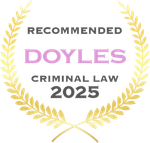
Recognised as Sydney's Most Dedicated Criminal Defence Law Firm
Trusted by A-listers & Sydney’s Elite
(Daily Telegraph 2020)


Experts in Complex Criminal Matters
Our Services
What Our Clients Say
Why Jackson John Defence Lawyers?
Free Initial 15-Minute Consultation
Talk to a lawyer who knows the law, specifically criminal law, get advice on your situation, and figure out your next steps.
See Our Fees & Quoting Upfront
Receive a costs estimate, after your initial consult and know the costs before we start. Jackson John only proceed with your approval with a signed agreement to avoid surprises.
Available to Discuss Your Issue
We're here for you in person, virtually or on the phone. We keep you informed, give solid advice, and take action as needed on your matter.




